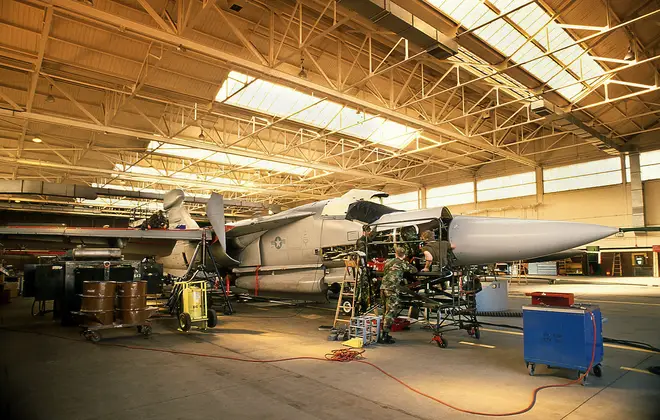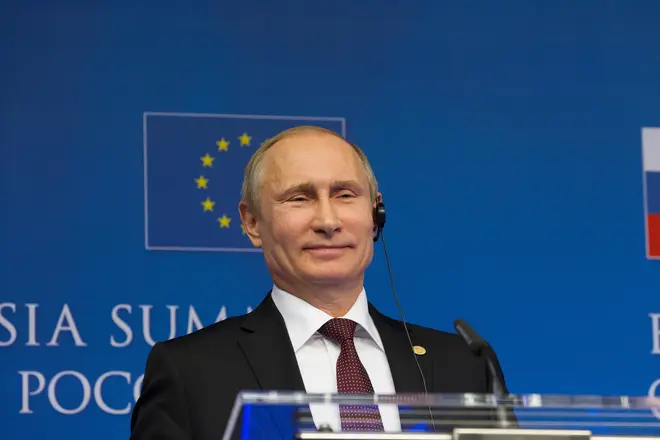
Tom Swarbrick 4pm - 7pm
22 February 2024, 07:00 | Updated: 23 February 2024, 10:46

LBC visits RAF Lossiemouth
RAF jets have been scrambled to respond to Russian military aircraft in British airspace at least 35 times in the last five years, LBC can reveal.
LBC’s discovery is accompanied by a stark warning that Moscow uses these flights to carry out simulated bombing raids on the United Kingdom.
Ministry of Defence figures obtained by LBC show that planes from the UK’s Quick Reaction Alert (QRA) station have been deployed on 66 occasions since 2018, responding to Russian aircraft on the majority of occasions.
The QRA is designed to provide an immediate response to potential terror threats on commercial airlines, technical failures and the presence of hostile states in UK airspace.

LBC gets a walkthrough of RAF Lossiemouth
Earlier this week, LBC was invited to visit RAF Lossiemouth in northeast Scotland, one of only two QRA stations in the UK, where Group Captain William Cooper, Commander of the RAF's Typhoon Air Wing at Lossiemouth, warned that his men and women had witnessed a “busy drumbeat” of Russian aircraft probing UK airspace.
“We have seen examples of Russian aircraft flying profiles which simulate some form of air to surface attack.
“Not only is that in itself quite alarming, but of course that means they might be getting quite close to the UK mainland and towards our territorial waters which is even more of a safety concern for us.
“I think we all understand that we are living in what is a very dangerous decade globally but especially in Europe and the Middle East.”
Read More: Putin plans to launch ‘killing spree’ against Russia critics in the UK after Alexei Navalny 'murder'
Read More: Putin's cod war: Russia tears up treaty that allowed UK trawlers to catch fish in Russian sea
Meanwhile, Wing Commander Rob McCartney, who leads the anti-submarine unit at Lossiemouth, emphasised that these concerns have resulted in British defence being on a “general push to become more lethal”.
“Increasing our lethality is all part of deterrence. The RAF is certainly on a push to become more lethal and more agile… we have procured a new Torpedo, a Stingray, a British torpedo, that gives us another option for that attack role.”


Amid increased instability across the globe, the Chancellor has come under intense pressure to increase defence spending in his upcoming Spring Statement. Last week, LBC revealed that former Defence Secretary Ben Wallace is lobbying for the Prime Minister to set a firm date by which the UK will be spending 3% of GDP on defence.
The UK’s defence capabilities have faced further scrutiny, moreover, after it was revealed that a Trident missile failed to launch effectively during a test of the UK’s nuclear deterrent last month. Despite these concerns, the MOD insisted it has “absolute confidence” in the nuclear deterrent.
On the specific threat posed by the Kremlin, Air Marshal Edward Stringer, who served as Assistant Chief of the Air Staff, told LBC that Russian aircraft has come perilously close to violating the twelve-mile perimeter around the British coastline that forms the UK’s sovereign airspace:
“I’ve known them get within a couple of miles and then they turn around and go back. One can imagine that what they’re doing is trying to monitor our performance in intercepting them.
“Russian aircraft [have] come down the North Sea, setting up on what look like simulated attack profiles for the launching of air-launched cruise miles”.
Christopher Steele, who led MI6’s Russia Desk between 2006-9, believes LBC’s findings reflect Russia’s “profound interest in the UK as an intelligence target”.
He added that this interest includes “precisely the sort of hostile aircraft incursion, surveillance and threat” detailed in LBC’s data, as well as the UK’s position as “the staunchest ally of Ukraine” in the eyes of the Kremlin.
On the possibility of conflict spilling over into NATO territory, and potentially sparking global conflict, Mr Steele said the re-election of President Donald Trump, about whom he compiled the famous ‘Steele dossier’, which claimed the then presidential candidate had been “compromised” by Russia’s FSB, could prove to be the biggest threat.
“I think the most dangerous point would be if Donald Trump were to be reelected president, or were to either question, undermine or leave the commitments that the US has under Article Five of the NATO Treaty, which is mutual defence…so I think that’s probably the most dangerous scenario.”